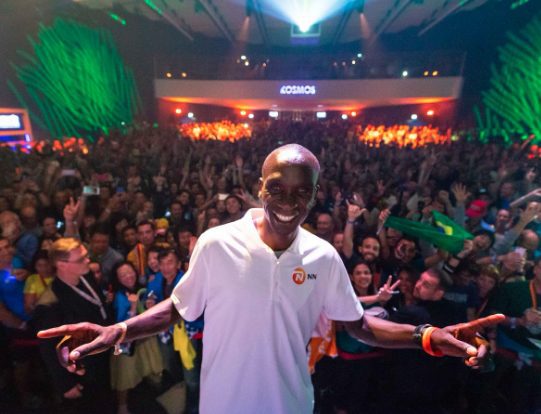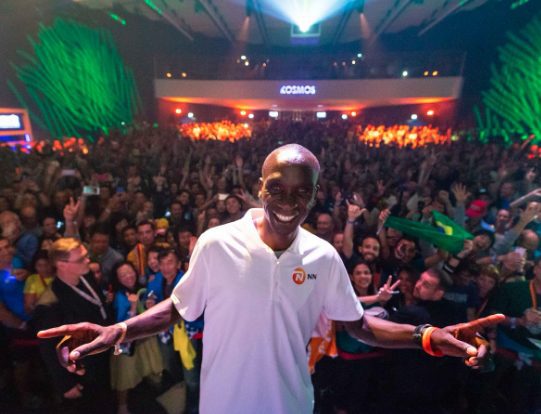Kipchoge’s world-record-setting Berlin marathon deconstructed
Students of the sport have been waxing ecstatic about every aspect of Kipchoge's history-making marathon


Fans and analysts have been deconstructing Eliud Kipchoge‘s mind-blowing marathon in Berlin on Sunday, and we’ve compiled some of the more astonishing observations to come out of his historic accomplishment:
RELATED: The personal messages the Breaking2 runners wrote on their shoes
The margin
Kipchoge didn’t break the record by a few seconds. He broke it by a minute and eighteen seconds. Seventy-eight seconds. Let that sink in. In his column for Outside online, journalist Alex Hutchinson referred to it as “by far the largest margin for more than half a century in an era of supposedly diminishing returns.”
Two of his three pacers had dropped out before he’d run 10 miles, the third dropping by 25K, leaving Kipchoge to battle alone for the remaining 17K, and depriving him of the opportunity to draft behind them. (Drafting behind pacers was a big factor in the Nike Breaking2 experiment, in which Kipchoge ran 2:00:25, and it was partly for that reason that his run was not record-eligible.)
The 10K splits
Remember when Kipchoge passed through the first 10km in 29:01 and everyone got excited because he was 30sec inside WR pace?
That was actually the slowest 10km segment of his race.
His 10km splits:
29:01
28:55
28:49
28:47His last 10km (from 32.195 to 42.195km) was ~28:33.
— Jon Mulkeen (@Statman_Jon) September 16, 2018
Kipchoge went out hard in the first 10K, sparking elation in viewers who knew he needed to average 29:10 per 10K to break Kimetto’s 2:02:57 world record. His first 10K split was 29:01, nine seconds ahead of WR pace. Then he got faster. And faster. That first 10K split would turn out to be his slowest of the race.
One tweeter reported that Kipchoge ran the final 10K of the race in 28:33, and that only 11 Americans had run a faster 10K thus far this year.
Mortal-paced recovery runs
Kipchoge ran 2:01:39 but runs 9:40 per mile pace on his recovery days.
Something to think about for those concerned in what their watch says.
— Johnny Crain (@Jacrain27) September 16, 2018
Sweat Elite, a U.S.-based coaching organization, has re-released an excerpt from Kipchoge’s training log in the weeks leading up to last year’s world record marathon attempt in Berlin. They warn recreational athletes against trying to adopt his regimen, without the decades of exceptional training and performance Kipchoge has delivered.
Apart from the sheer volume of mileage, one thing is notable–and reassuring: with double workouts seven days a week at altitude in Kenya and his weekly mileage (averaging about 150K per week towards the end of the build), some of Kipchoge’s recovery runs start at a pace the average mortal can actually relate to–i.e. six minutes per kilometre.
Quick summary of my reaction to Eliud Kipchoge's 2:01:39 marathon world record:
[long silence… mouth hanging open but not making any sounds… more silence]
Here's the extended version of my reaction:https://t.co/KrXMyvkO6j
— Alex Hutchinson (@sweatscience) September 17, 2018
The negative split
Running a negative split is ideal. It takes incredible discipline to hold back in the first half of a race–not that Kipchoge could be said to be holding back, at the pace he was running, but the idea is to hold enough in reserve to get stronger and stronger throughout the race. This Kipchoge did in spades.
First 21.1K: 61:06
Last 21.1K: 60:34
According to Hutchinson, Kipchoge’s second half-marathon split is faster than all but four American half-marathon times.
RELATED: Marathon pacing 101: How the heck to actually run a marathon
Journalist Alex Hutchinson has written an excellent analysis of Kipchoge’s race for Outside online, which you can read here.
After the finish line
This song makes every sports moment better pic.twitter.com/PeialX6IAU
— CITIUS MAG (@CitiusMag) September 16, 2018
After crossing the tape, he didn’t stop. He kept running, straight into the arms of his coach, Patrick Sang. The guys at Citius Mag kindly set the footage to the strains of Celine Dion’s “My Heart Will Go On.” Bet you can’t watch it without tearing up.
And finally, pundits are now betting on how long Kipchoge’s world record will last. Significantly, Hutchinson believes that even though he didn’t actually break 2, and subsequent chances to break the world record at Berlin in 2017 and this year in London failed, it played an indisputable role in Kipchoge’s ability to perform yesterday.


